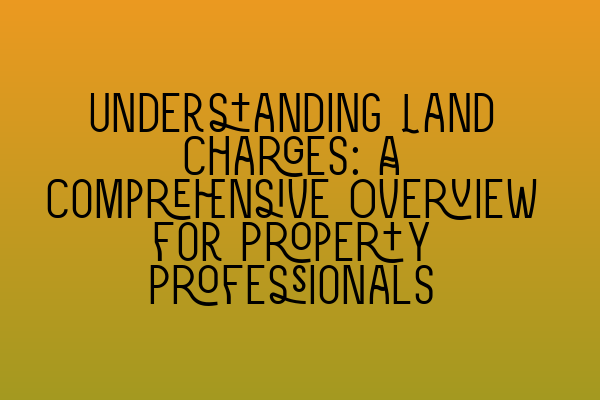Understanding Land Charges: A Comprehensive Overview for Property Professionals
As a property professional, it is crucial to have a thorough understanding of land charges and their impact on property transactions. Land charges are a critical aspect of property law, and a clear comprehension of these charges can help ensure a smooth and efficient transaction process for both buyers and sellers.
What are Land Charges?
Land charges are legal interests or rights that affect a property and are registered against the property owner or the property itself. These charges provide important information about the property’s history, any restrictions or obligations associated with it, and potential risks for potential buyers or lenders.
There are various types of land charges, including:
- Restrictive Covenants: These are restrictions imposed by previous owners that limit the use or development of the property.
- Easements: An easement grants a third party certain rights over the property, such as access to a shared driveway or right of way.
- Leases: A lease grants a tenant the right to occupy and use the property for a specific period, subject to agreed-upon terms and conditions.
- Mortgages: A mortgage is a loan secured against the property, with the lender having the right to repossess the property in case of default.
Why are Land Charges Important?
Land charges are crucial because they provide essential information to property professionals, potential buyers, and lenders. They help identify any restrictions, obligations, or potential risks associated with the property, allowing parties to make informed decisions.
For property professionals, understanding land charges is essential for conducting due diligence on behalf of their clients. By identifying and analyzing land charges, property professionals can advise clients on potential legal, financial, or practical implications of the charges.
For potential buyers, understanding land charges is crucial to be aware of any restrictions on the property’s use and development. It also helps evaluate the property’s value and assess any potential risks before making a purchase decision.
Similarly, lenders rely on land charge information to assess the risk associated with granting a mortgage. They want to ensure that the property is free from any significant legal issues that could impact its value or their ability to recover their investment in case of default.
How are Land Charges Registered?
Land charges are registered with the Land Charges Department of the HM Land Registry. The registration process ensures that the charges are made public and accessible to anyone interested in the property.
The registration of land charges involves submitting the necessary documentation, including application forms and supporting evidence, to the Land Charges Department. It is essential to accurately complete the forms and provide all required information to ensure a successful registration.
Once registered, land charges appear on the official search records and are available for inspection by property professionals, potential buyers, and lenders. These records offer valuable insights into the property’s history and any encumbrances affecting it.
How to Deal with Land Charges?
As a property professional, it is crucial to identify and address any land charges affecting a property during the transaction process. This involves conducting thorough searches and investigations to gather information about potential charges.
When dealing with land charges, the following steps are typically taken:
- Obtain the official search records from the Land Charges Department to review any registered charges.
- Analyze the nature and implications of the charges, considering factors such as their enforceability, duration, and potential impact on the property’s use or value.
- Advise clients, potential buyers, or lenders about the existence and implications of the land charges. This includes informing them about any restrictions, obligations, or risks associated with the property.
- Explore options for addressing or mitigating the impact of land charges, such as applying for discharge or modification of restrictive covenants or negotiating new lease agreements with favorable terms.
By diligently addressing land charges during the transaction process, property professionals can help their clients make informed decisions and navigate any potential challenges or risks associated with the charges.
Conclusion
Understanding land charges is essential for property professionals to ensure smooth and successful property transactions. By comprehending the different types of land charges, their registration process, and their implications, property professionals can provide valuable advice to clients and help them make informed decisions.
If you’re preparing for the SQE exams, make sure to check out our related articles:
